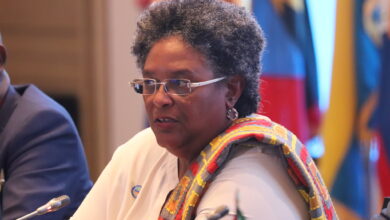(CARICOM Secretariat, Turkeyen, Greater Georgetown, Guyana) The third leg of the Caribbean Community (CARICOM) National Consultations on Gangs and Gang violence project opened in St Kitts and Nevis on Monday with a call from that country’s Minister of Social Development Culture and Gender Affairs Honourable Marcella Liburd for “traditional shapers of society “to reassert their role in order to mitigate the culture of youth gangs and violence which has pervaded the society.
She was addressing more than sixty stakeholders at the national consultation in St Kitts organized to pave the way for the implementation of a pilot project on Youth Gangs and Gang violence in that Federation.
“It is clear that the traditional socialization institutions – home, church, community and school – are failing to inculcate values in the youths … and their role is fast being usurped by new media technologies,” the Minister asserted.
Minister Liburd added that parents and other socialization agents did not fully understand the implications of the shift in role models and socialization agents and were really out of step with what’s happening in this global society. “We all need to get back into step” she stressed.
What was needed to curtail violence, according to the Minister, was a two pronged approach including tradition law enforcement and social interventions for crime prevention.
Funded by the United Nations Development Programme (UNDP), the consultation is the third in a series organized to assess the needs of the four countries – Belize, Guyana, St Kitts and Nevis and Trinidad and Tobago – involved in the pilot project. The Youth Gangs and Gang violence pilot project.
The project forms part of the first component of the CARICOM Social Development and Crime Prevention Action Plan which was developed by the CARICOM Secretariat in tandem with the United Nations Office of Drugs and Crime (UNODC) to “prevent and reduce levels of violence and crime in Member States, through a cross-sectoral and multi-disciplinary approach…” The plan is grounded in five pillars – reduce violence; foster social inclusion; promote integration; empower victims; and protect the environment and economic resources – which are linked to the regional development agenda.
Minister Liburd was convinced that the transformative approach to youth interventions should be evidence based, action oriented and aligned with Governments’ socio-economic agenda – not just welfare oriented which gave rise to dependency and materialism.
She outlined a slew of interventions that the Government of St Kitts and Nevis had undertaken to combat youth gangs and violence, noting that her country had embraced the need to sustain the crime prevention initiatives and to strengthen collaboration with partners for effective delivery of those initiatives.
In this regard, she reported that St Kitts and Nevis would continue to work in concert with the CARICOM Secretariat and other international development partners to focus on civic participation, education and workforce, drug demand reduction, juvenile justice reform and regional coordination as critical strands of social development and crime prevention.





